Rectal Cancer — Radiation and Chemotherapy: treatment in the Best Hospitals of Germany
Treatment prices are regulated by national law of the corresponding countries, but can also include additional hospital coefficients. In order to receive the individual cost calculation, please send us the request and medical records.
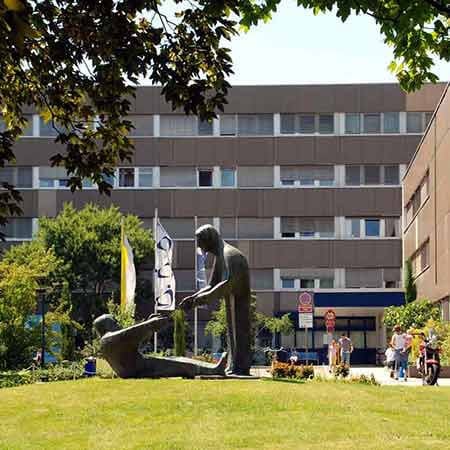
Department of Hematology and Oncology
The Department of Hematology and Oncology treats solid malignant tumors of various localizations, blood cancer, and benign hematopoietic pathologies. A qualified team consisting of oncologists, hematologists, psycho-oncologists, physiotherapists, and experienced nursing staff takes care of the health of patients. Whenever required, doctors from related medical fields are also involved in the therapeutic process. All specialists make every effort to provide patients with effective and personalized medical services while surrounding them with care. The department is part of the Cancer Center of the hospital, which is certified according to the requirements of the German Cancer Society (DKG). The department prefers a multidisciplinary approach, holding weekly tumor boards with the participation of oncologists, hematologists, radiation therapists, and surgeons, as well as highly specialized experts in gynecology, urology, gastroenterology, pulmonology, etc. The department's specialists have in their arsenal modern treatment methods for malignant diseases, including chemotherapy, targeted therapy, immunotherapy, hormone therapy, and many others. Patients with advanced stages of cancer are offered palliative care aimed at alleviating pain syndrome and ensuring a decent quality of life.
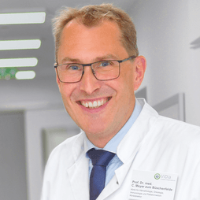

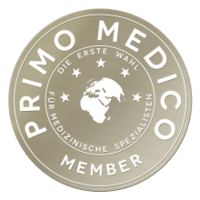
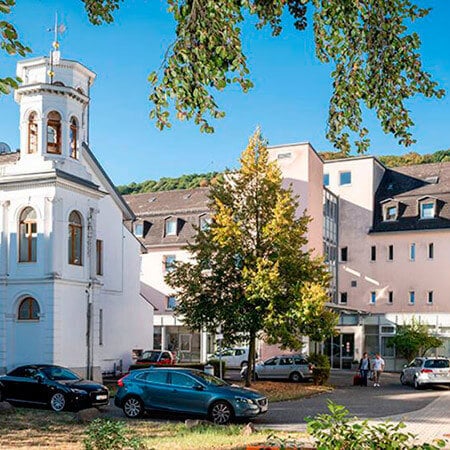
Department of Oncology and Palliative Care
The Department of Oncology and Palliative Care provides palliative treatment for patients with incurable diseases. The goal of the department's physicians is to alleviate the symptoms of the disease and improve the quality of life. The department's specialists take an individual approach to each patient, always respecting the patient's wishes. A competent multidisciplinary team, consisting of palliative care specialists, nurses, psycho-oncologists, physiotherapists and social workers, works here for the benefit of the patients.
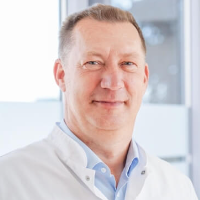




Department of Oncology and Surgical Oncology
The Department of Oncology and Surgical Oncology specializes in the conservative and surgical treatment of the full range of cancers. The department is one of the leading in the field of its competence in the international medical arena and treats patients with especially complex clinical cases. The priority focuses of the department's medical team include regional chemotherapy, hyperthermia, immunotherapy, surgical oncology and pain therapy. The goal of the department's doctors is to achieve an optimal therapeutic result with minimal damage to the healthy tissues.
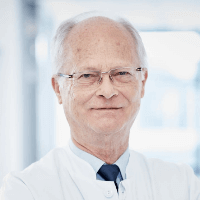
The hospitals in developed countries have achieved tremendous success in rectal cancer treatment. Therefore, in the case of such diagnosis, the patients often go to Germany to undergo treatment. They receive more effective and safer treatment there. In most cases, it is successful up to stage 3 inclusive. The doctors achieve considerable success even at the 4th stage of the disease. If the pathology cannot be completely cured, the doctors at least achieve long-term remission and increase the patient's life expectancy.
At what stages can chemotherapy and irradiation be used?
At different stages of rectal cancer, chemotherapy and irradiation play a different role in the treatment of the disease.
Stage 0. This stage requires only surgical treatment, but does not involve the use of any additional techniques.
Stage 1. In most cases, the doctors manage to treat the pathology using the surgical method. Sometimes, when performing a surgical procedure, the doctors find out that colorectal cancer has spread more than it was previously seen. If the risk of relapse is rated as high, the chemotherapy course will be carried out. If it is contraindicated, the doctors prescribe irradiation, but it may be less effective. Therefore, chemotherapy is preferred.
Stage 2. This stage always involves the use of irradiation and chemotherapy. These methods are usually applied conjunctively after surgery. They may sometimes be applied prior to surgery in order to reduce the tumor size.
Stage 3. The tumor reaches a large size and extends metastasis to the nearest lymph nodes. Both chemotherapy and irradiation are often performed prior to surgery. This allows the doctor to reduce the tumor size and subsequently remove it totally.
Stage 4. The operation cannot always be used, but still it is performed much more often than in other types of malignancies. For example, the treatment of stage 4 stomach cancer in Germany does not involve the use of radical surgery at all, but rectal cancer can be treated using surgery, and it can be successful. Even if the disease cannot be cured completely, the doctors can increase the patient's life expectancy. Both chemotherapy and irradiation can be applied additionally. If surgery is contraindicated, they become the main methods, which allow to control the tumor growth.
Thus, in most cases, only surgery is enough to cure the disease at stages 0 and 1. At the stages 2 and 3, chemotherapy and radiation therapy can be used before or after surgery. At the stage 4, they may be the only treatment option if surgery is not possible or impractical.
The role of radiation therapy in rectal cancer treatment
Radiation therapy can be applied in the treatment of most types of malignancies. Irradiation is carried out in the treatment of esophageal cancer or stomach, breast or endometrial cancer. Rectal cancer is not an exception.
In the case of this disease, radiation therapy can be used in the following cases:
- prior to operation, in combination with chemotherapy, in order to reduce the tumor size and facilitate the process of its removal;
- after surgery, if the doctor is not sure that the tumor was totally removed, as well as in the case of cancer spread to the abdominal cavity;
- during surgery, in order to destroy the remaining cancer cells and reduce the risk of relapse;
- in combination with chemotherapy, as the main treatment method, if the operation cannot be performed due to medical contraindications, patient's refusal or other reasons;
- as a palliative method for reduced pain, prevention of hemorrhage and elimination of intestinal obstruction;
- for the destruction of metastatic foci in distant organs and tissues, including the brain and bones.
Both external and contact radiation therapies can be used. In external therapy, the source of radiation is outside the body. The beams are directed to the tumor and destroy the cancer cells. In contact types of radiation therapy, the radiation source is inserted directly into the human body. Contact radiation therapy has the following types:
Interstitial brachytherapy. A tube is inserted into the tumor through the rectum. The radioactive seeds are placed in it for several minutes. The procedure is carried out once a week. It can be single or it can be performed several times, depending on the specificities of the disease, the patient's well-being and the achieved results of cancer treatment in Germany.
Endocavitary radiation therapy. A balloon is inserted into the rectum. A radiation generating device is placed in it. The treatment requires up to 4 sessions of such radiation therapy. It is often combined with external beam radiation therapy. The technique is used infrequently, only for some types of cancer. The breaks between sessions last 2 weeks.
Interstitial brachytherapy is considered the safest method. The seeds emit a very short irradiation, and therefore they almost do not damage the surrounding tissue.
External irradiation almost always produces side effects. These can be redness of the skin, diarrhea, anal pain, fecal incontinence, erection problems.
The role of chemotherapy in rectal cancer treatment
One of the most commonly used methods of cancer treatment in Germany remains chemotherapy. The drugs, which block the growth of rapidly dividing cells, are injected into the body. The cancer cells divide very rapidly, and therefore drugs primarily affect them, but chemotherapy also has systemic side effects, which cannot be avoided.
Colorectal cancer treatment regimens in Germany. There is a large number of drugs and their combinations. Most drugs are administered intravenously. Some of them are applied in pill form. The doctors usually use at least 2 drugs simultaneously. Chemotherapy can often be complemented with targeted therapy.
The local chemotherapy methods can sometimes be applied as well. They are applied if the cancer spreads to the abdominal cavity or liver. The local chemotherapy allows the doctor to create a large concentration of the drug directly in the lesion. In the case of cancer spread to the abdominal cavity, the patient can undergo intraperitoneal chemotherapy. Should liver metastasis be detected, hepatic artery chemoembolization will be used. It is blocked with emboli to reduce the blood supply to the tumor. The emboli contain the chemotherapy drugs. They release these drugs, after which they enter the cancer cells and destroy them.
Treatment and diagnostics in Germany with the Booking Health company
You can get the highest quality medical services in Germany. One can find there many hospitals, which have achieved success in certain fields of oncology. Some of them specialize in esophageal cancer treatment, others succeed in breast cancer treatment, while others are best in colorectal cancer treatment.
The Booking Health company will organize your treatment in German hospitals at an affordable cost. We have been engaged in medical tourism for a long time and are leaders in this field. The success of our work is confirmed by thousands of reviews of satisfied customers around the world. If you book a colon cancer treatment program in Germany through the Booking Health service, you will get the following benefits:
- Selection of a medical facility based on the specific clinical case. For example, we can offer the best hospitals for the diagnostics and treatment of stage 3 colon cancer.
- Reduced prices for treatment in Germany due to the lack of overpricing and coefficients for foreign patients. Your savings reach 50%.
- Booking the appointment with a doctor on the most suitable dates for you.
- Preparation of the program taking into account previously performed examinations.
- Establishment of communication directly with your attending physician.
- Monitoring of the medical program at all its stages
- Control of the costs of procedures, your invoices and return of unspent funds upon the program completion.
- Assistance in buying and forwarding of medicines.
- Organization of additional diagnostics in Germany.
- Communication with the German clinic upon treatment completion.
We will provide high level services. The specialist of the Booking Health company will book a hotel room and airline tickets for you. We will meet you at the German airport, take you to the hospital and provide you with interpreting services.

